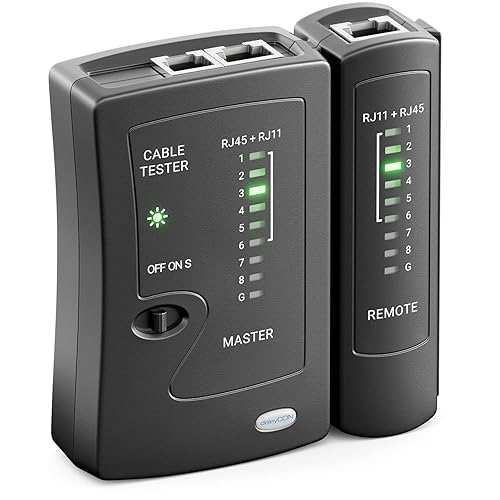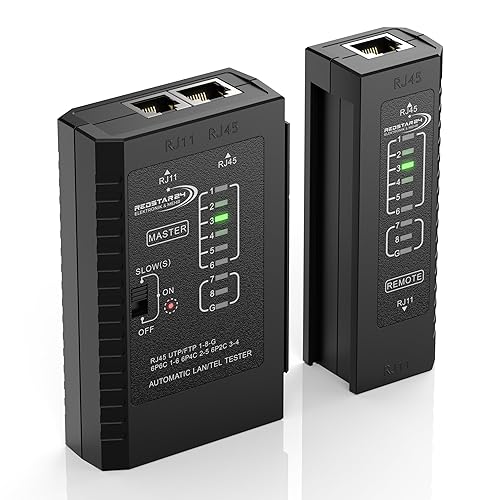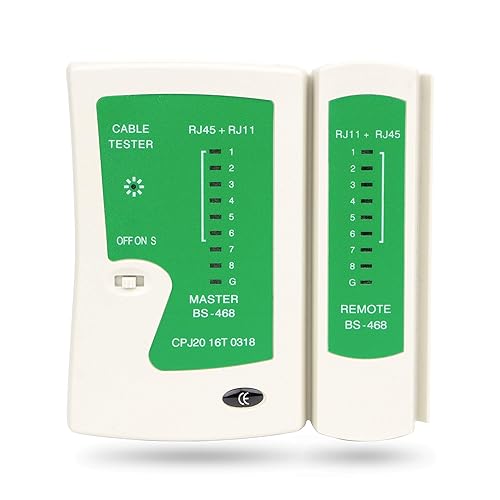How to Choose an RJ45 Cable Tester in 2025? Guide and Comparison
An RJ45 cable tester is an essential tool for maintaining reliable computer networks. Whether for installing a new network or troubleshooting an existing connection, an RJ45 cable tester helps you quickly identify potential issues. Here's how to choose the right RJ45 cable tester.
Our TOP 3
deleyCON

Pros
- Extended functionality for different cable types
- Easy to use
- Good value for money
Cons
- Reliability questioned by some users
Specs
RedStar24

Pros
- Ease of use and installation
- Fast and accurate testing
- Sturdy design, ideal for frequent use
Cons
- Modules difficult to detach
Specs
Incutex

Pros
- Can test RJ45, RJ11, and BNC
- Simple and good value for money
- Effective for installed cable testing
Cons
- Batteries not included
Specs
Selection Criteria
Available Test Types
It is crucial to choose a tester that performs various types of diagnostics. Basic features include checking cable continuity, identifying reversed or crossed wires, and measuring cable lengths. More advanced models can also test crosstalk (NEXT), attenuation, and even certify compliance with TIA/EIA standards.
Ease of Use
Testers should be easy to use, with an intuitive user interface. Models with LCD screens that clearly display results are recommended. Look for features such as auto-detection and an automated test mode for significant time savings.
Range and Compatibility
Ensure the tester is compatible with all cable categories you plan to use, from Cat5e to Cat8 for the most modern installations. Good testing range is also essential, especially for installations in large buildings or open spaces.
Ruggedness and Durability
Working conditions often vary, and a cable tester must be sturdy enough to withstand harsh environments. Opt for a model with a shock-resistant case and a good degree of protection against dust and moisture.
Common Mistakes
Ignoring Calibration
As with other types of testers, failing to calibrate your RJ45 cable tester regularly can lead to inaccurate readings. Be sure to follow the manufacturer's recommendations for maintenance and calibration.
Overlooking Technological Compatibility
In 2025, new standards and cable categories are emerging. Not choosing a tester compatible with the latest standards could limit its usefulness. Ensure your device is compatible with the most recent technologies.
Skimming the User Manual
RJ45 cable testers can have complex features that require a good understanding for effective use. Taking the time to thoroughly understand the user manual is crucial to avoid errors during testing.
Comparison of our 3 favorite products
deleyCON- Extensive compatibility with RJ11, RJ12, RJ45

The deleyCON network cable tester is distinguished by its ability to test a wide range of cables, from RJ11 to RJ45, including CAT6 to CAT8. It's an ideal tool for network renovations or restructurings thanks to its ease of use and integrated LED display for each individual wire. Its universal functionality makes it a versatile ally for networking professionals.
Pros
- Compatibility for many wiring types
- Easy to use, easy to handle
- Good value for money, ideal for occasional use
Cons
- Reliability questioned by some users
RedStar24- Robust and portable design

The RedStar24 network tester is known for its robustness and ease of use. Designed to last, it perfectly adapts to intense work environments. Thanks to its practical LED display and ability to quickly test various cable types, it is an ideal choice for on-site technicians looking for a reliable and efficient tool.
Pros
- Easy to use with a single command button
- Effective and portable for on-site interventions
- Robust, designed for frequent and intensive use
Cons
- Modules difficult to detach during setup
Incutex- Includes BNC in addition to standard connectors

The Incutex tester offers unique compatibility by integrating the ability to test BNC cables, in addition to the traditionally supported RJ45 and RJ11 cables. Its light weight and competitive price make it an excellent choice for pre-installed cable configurations, while maintaining simplicity and effectiveness thanks to its two-speed testing and intuitive LED system.
Pros
- Also supports BNC cables
- Easy to use, even for already installed cables
- Affordable with a two-speed test function
Cons
- 9V batteries not included, requiring separate purchase
Practical Tips
Precise Labeling: When testing cables, use labels to track tested connections. This helps avoid confusion and ensures clear documentation.
Document the Results: For future maintenance, record the results of each test. This helps track network evolution and aging.
Use a Tester with PoE Functionality: If you're using cables to power devices via Power over Ethernet (PoE), choose a tester capable of confirming PoE compatibility.
FAQ
See also: